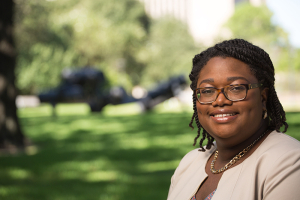Maya Gough, a biomedical engineering graduate student at the UH Cullen College of Engineering, was invited to speak at the 2016 Engineering in Medicine and Biology Society (EMBC’16) International Conference this summer. This year’s theme was “Empowering Individual Healthcare Decisions through Technology,” and presentations covered diverse topics including cutting-edge biomedical and healthcare technology research, clinical applications and biomedical education.
Gough was one of only 30 students from around the world selected to present her research at the conference during the NSF Graduate Research Fellowship Program Info Session. Her research was chosen for this award based on its intellectual merit and potential for broader impact.
Gough’s research focuses on the effects of vitamin D deficiency on a cell affected by tuberculosis (TB). TB is an infectious bacterial disease that primarily attacks the lungs, causing chronic cough, fever, weight loss and night sweats. The Centers for Disease Control and Prevention estimates that nearly one-third of the world’s population is infected with TB, and though there are treatment options for the disease, it causes nearly 1.5 million deaths worldwide each year.
Recent research has found that vitamin D deficiency decreases immune function and increases the risk of death from TB.
Gough said she believes personalized healthcare options are an essential next step for the treatment of the deadly disease.
“Why can we cure some patients, but not all? Why do some patients respond to a treatment, but the same medicine doesn’t help others?”, she asks.
Under the guidance of her faculty advisor Elebeoba May, Gough is developing a single-cell computational model to help answer these questions. The model takes into account numerous variables that can impact a patient’s treatment, such as environment, age, existing hereditary and environmental influences, and social and cultural impacts. To gather this information, Gough mines through extensive existing qualitative, clinical and quantitative data sets to inform her simulations and guide her experiments. Ultimately, her goal is to build an expansive platform that can be added to and used by other scientists.
“Right now, we are creating a platform that’s based on just one cell, but it can grow to include many cells, or even whole body system,” she said. “In the future, other researchers can pick it up or add to it to keep growing the platform.”
Gough said presenting this work at the EMBC’16 conference was a wonderful opportunity to share it with leaders in the biomedical field.
“The conference was phenomenal, and presenting my research there was almost surreal,” she said. “I take my work seriously and it was really validating to see other people connecting with it and finding it important as well.”
The EMBC’16 conference took place at the Walt Disney World Resort in Orlando, Florida from August 16-20. Gough received an award of $500 in addition to presenting her research.
